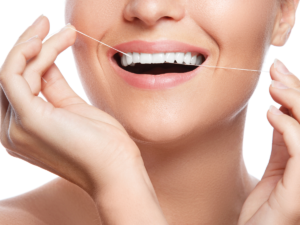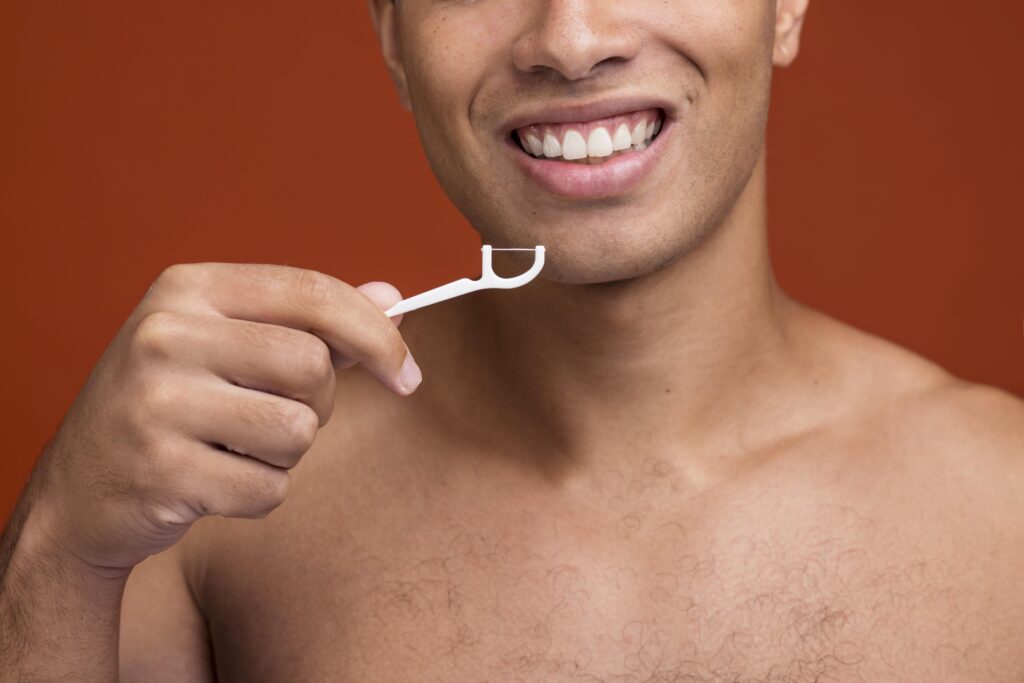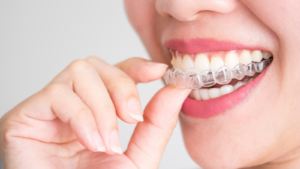Introduction:
Oral health frequently suffers in the shuffle of our everyday lives. We diligently brush our teeth, but how many of us can claim to be equally committed to dental flossing? The truth is, dental floss is a powerful tool in the arsenal of oral care, and dedicating just one minute daily to this simple routine can lead to total tooth triumph. In this comprehensive exploration, we’ll delve deeper into the Dental Floss Benefits, explore its benefits, and guide you on how to make it an integral part of your daily oral hygiene routine.
The Dental Dilemma
The majority of us are familiar with the standard oral care routine – brushing our teeth twice a day. While brushing is undoubtedly crucial for maintaining good oral health, it has its limitations. Toothbrushes are effective at removing plaque from the surfaces of our teeth, but they often fall short when it comes to the tight spaces between them. This is where dental floss steps in as a superhero for your gums and teeth.
Understanding the Power of Dental Floss
Dental floss is a thin, flexible strand designed to slide between teeth, reaching areas that your toothbrush can’t access. Its primary function is to remove plaque and food particles from the gaps between teeth and along the gumline. Neglecting these spaces can lead to the accumulation of plaque, which, over time, may harden into tartar and contribute to various dental issues, including cavities and gum disease.
Benefits of Dental Flossing
1. Prevents Gum Disease:
Dental flossing is a potent weapon against gum disease. By removing plaque from between your teeth, you significantly reduce the risk of gingivitis and more severe gum conditions.
2. Cavity Prevention:
Those tight spaces between your teeth are a breeding ground for bacteria. Dental floss helps eliminate these bacteria, preventing the formation of cavities.
3. Fresh Breath:
Bad breath often stems from leftover food particles and bacteria in the mouth. Flossing ensures you remove these culprits, promoting fresher breath.
4. Preserves Your Smile
: Dental flossing is an investment in the longevity of your teeth. By preventing decay and gum issues, you contribute to the preservation of your beautiful smile.
5. Enhances Gum Health
Flossing is not just about your teeth; it’s equally crucial for your gums. It stimulates the gums, promoting blood circulation and overall gum health.
How to Incorporate Dental Floss into Your Daily Routine
Now that we understand the importance of dental floss, the next step is to make it a seamless part of our daily routine. Here’s a more detailed guide to help you incorporate dental flossing into your oral care regimen:
1. Choose the Right Floss
There are various types of dental floss available, including waxed, unwaxed, flavored, and unflavored. Experiment with different options to find the one that suits your preferences and needs.
2. Create a Flossing Schedule
Designate a specific time each day for dental flossing. Whether it’s in the morning or before bedtime, consistency is key. Consider setting a reminder on your phone until it becomes a natural part of your routine.
3. Proper Flossing Technique
Break off a piece of dental floss (about 18 inches) and wind most of it around your middle fingers, leaving a small section for flossing. Gently slide the floss between your teeth, curving it around each tooth in a ‘C’ shape to reach beneath the gumline.
4. Be Gentle, Not Forceful
Avoid snapping or forcing the floss between your teeth, as this can damage your gums. Instead, use a gentle back-and-forth motion to glide the floss into place.
5. Floss Every Tooth
Take the time to floss between every tooth, including the back molars. Neglecting any area could leave behind plaque and compromise your efforts.
6. Rinse and Smile
After flossing, rinse your mouth with water to remove dislodged particles and leftover plaque. Admire your clean teeth and the refreshing feeling of a well-flossed mouth. Don’t forget to smile – you’ve just invested in your oral health!

The Psychological Aspect of Dental Flossing
Beyond the physical benefits, dental flossing has a psychological aspect that contributes to its effectiveness. Taking that one minute each day to care for your teeth and gums creates a sense of discipline and self-care. It’s a small yet impactful act of self-love that resonates throughout your day, promoting a positive mindset and overall well-being.
Moreover, the act of flossing can be meditative. As you focus on each tooth, you become more attuned to the present moment, fostering mindfulness. This short daily ritual not only enhances your oral health but also contributes to your mental and emotional balance.
Overcoming Common Flossing Challenges
While the benefits of dental flossing are undeniable, many people still struggle to make it a consistent habit. Let’s address some common challenges and provide practical solutions:
1. Time Constraints:
The most common excuse for skipping flossing is a lack of time. However, as we’ve emphasized, it only takes one minute. Consider it an investment in your long-term health, and you’ll find that the returns are well worth the time spent.
2. Discomfort or Bleeding:
If you experience discomfort or bleeding while flossing, don’t be discouraged. This can be a sign of gum inflammation, which is precisely what flossing aims to alleviate. As you continue to floss regularly, you’ll likely notice improvement, but if issues persist, consult your dentist.
3. Boredom or Lack of Motivation:
To combat boredom, consider playing your favorite song or podcast while you floss. Alternatively, try different types of dental floss or flossing tools to keep things interesting.
4. Inconsistent Routine:
Building a habit takes time, and it’s normal to forget occasionally. Be patient with yourself and make a conscious effort to get back on track. Consider enlisting a family member or friend as a flossing buddy to keep each other accountable.
The Economic Impact of Flossing
Beyond personal health benefits, dental flossing also has economic implications. The cost of treating dental issues can be significant, involving expenses for dental procedures, medications, and potential time away from work for appointments. By investing in preventive measures like regular flossing, you not only save money in the long run but also contribute to a more sustainable healthcare system.
Dental Floss Innovation: Beyond Traditional Floss
As technology advances, dental care innovations continue to emerge. Traditional dental floss remains highly effective, but for those who struggle with manual flossing, alternative options are available. Electric or battery-powered flossers, interdental brushes, and water flossers offer additional choices to cater to individual preferences and needs. Experiment with these tools to find the one that complements your routine and enhances your oral care experience.
Educating the Next Generation
As we advocate for the benefits of dental flossing, it’s essential to pass on this knowledge to the next generation. Teaching children the importance of flossing from an early age sets the foundation for a lifetime of good oral habits. Dr. Manasi, the best dentist in Thane, guides dental care with informative blogs.
Frequently Asked Questions (FAQs) about Dental Flossing
1.Why is dental flossing important?
Dental flossing is crucial because it reaches areas between your teeth that a toothbrush can’t access. It helps remove plaque and food particles, preventing gum disease, cavities, and promoting overall oral health.
2. How often should I floss my teeth?
Flossing should ideally be done once a day. Establishing a consistent routine, whether in the morning or before bedtime, ensures that you effectively remove plaque and maintain optimal oral hygiene.
3. Is there a specific technique for dental flossing?
Yes, proper technique matters. Break off about 18 inches of dental floss, wind most of it around your middle fingers, leaving a small section for flossing. Gently slide the floss between your teeth, curving it around each tooth in a ‘C’ shape to reach beneath the gumline.
4. Can flossing cause bleeding or discomfort?
Initially, you might experience some discomfort or bleeding, especially if your gums are inflamed. This is a sign that flossing is necessary to improve gum health. With regular flossing, you should notice a reduction in these issues.
5. I don’t have much time. Can I skip flossing occasionally?
While it’s understandable that life gets busy, skipping flossing occasionally can impact your oral health. Try to prioritize that one minute each day – it’s a small investment with significant long-term benefits.
6. What type of dental floss should I use?
There are various types of dental floss available, including waxed, unwaxed, flavored, and unflavored. The best type for you depends on personal preference and the spaces between your teeth. Try out a variety of ideas to determine which one works best.
7. Are there alternatives to traditional dental floss?
Yes, there are alternatives such as interdental brushes, electric or battery-powered flossers, and water flossers. For those who struggle with traditional flossing, these may be useful. Experiment with different tools to discover what suits you best.
8. How can I make flossing more enjoyable?
To make flossing more enjoyable, consider playing music, listening to a podcast, or even watching a short video while you floss. You can also try different flavors of dental floss or flossing tools to add variety to your routine.
9. My child dislikes flossing. Any tips to make it more appealing for them?
Making flossing fun for children is crucial. Consider using colorful or flavored floss, letting them choose their own dental floss, or turning it into a family activity. Positive reinforcement, such as praise or small rewards, can also encourage them to make flossing a habit.
10. Can I use dental floss if I have braces or dental work?
Yes, you can still use dental floss with braces or dental work. However, you may need to use specialized tools, such as orthodontic flossers or threaders, to navigate around wires and brackets. Consult your orthodontist for guidance on the best flossing approach for your specific situation.
Photo Credit:
https://www.freepik.com/free-photo/front-view-young-male-using-dental-floss_10349733.htm





